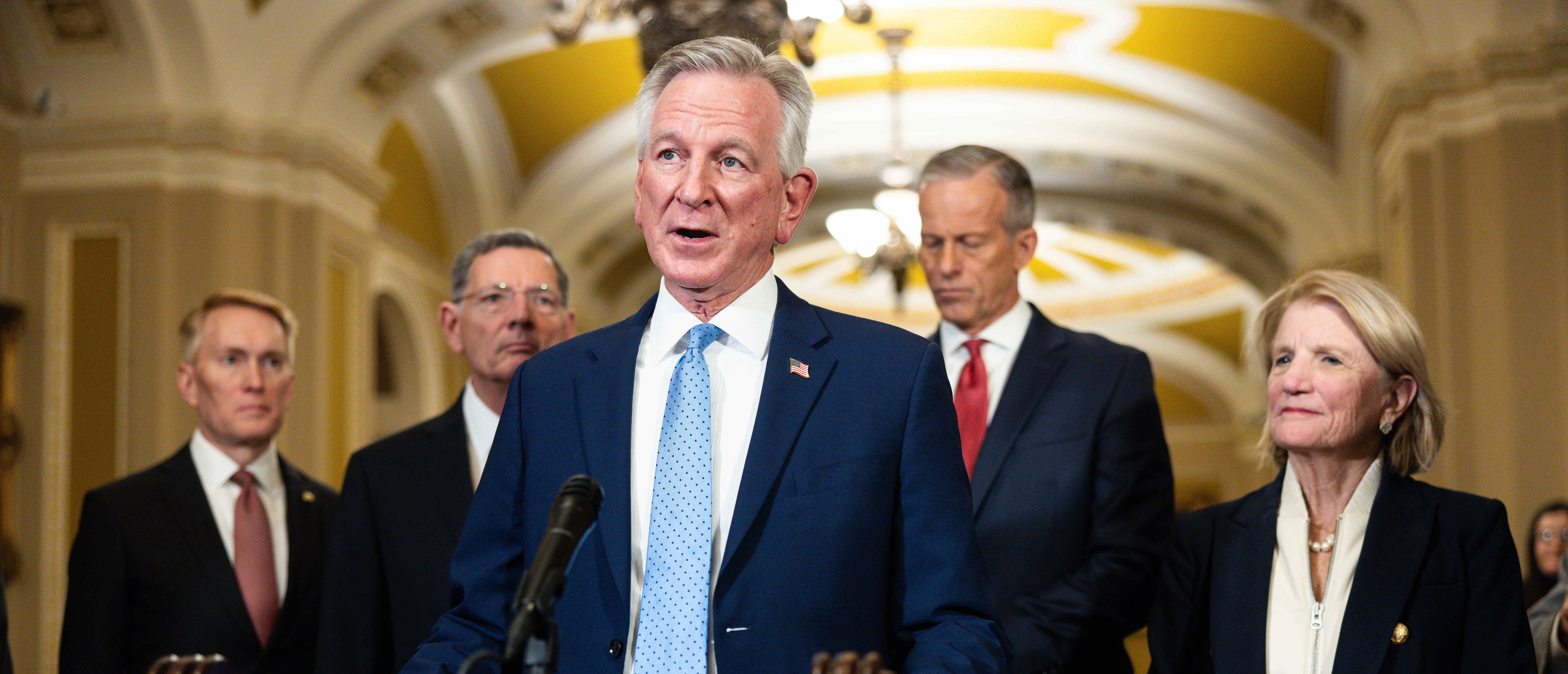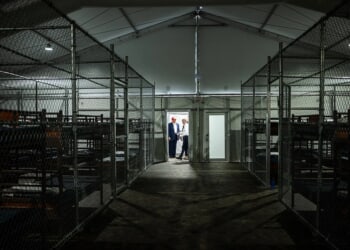Senate Republicans are racing towards Senate Majority Leader John Thune’s July 4 goal to pass President Donald Trump’s “one, big beautiful bill,” but issues continue to arise for GOP leadership as the list of items senators hope to add to the bill grows longer.
Trump gave the Senate the go-ahead to make changes to the budget bill in May, when Thune was aiming to make as few alterations to the bill as possible. The bill’s initial fiscal and Medicaid-centered pushback has grown, and now a coalition of Senators is calling for bill alterations, from auto taxes to state Supplemental Nutrition Assistance Program (SNAP) contributions.
One of the newest developments regarding the bill’s path in the Senate is from Republican Ohio Sen. Bernie Moreno, who has been advocating for alterations to auto taxes.
Moreno, who ran a successful multi-location car dealership business, prior to his election to the Senate, broke down his “6 Point Plan for Autos in Reconciliation” in fliers he passed out to his colleagues last week. Pitched in the flier were auto loan interest deductions, ending electric vehicle tax subsidies by Sep. 30 2025, raising annual fees on electric vehicles (EVs), raising tariffs on tire imports outside of the United States-Mexico-Canada Agreement (USMCA), removing fines for automakers who do not meet federal fuel economy standards and lowering taxes on trucks.
Moreno handing out these last week to colleagues pic.twitter.com/7hiLQSP6Ik
— Burgess Everett (@burgessev) June 9, 2025
Moreno has also been vocal about Medicaid work requirements, calling for them to be implemented in the beginning of 2026 rather than at the end of that year — when they would be scheduled to go into effect per the House-passed version of the bill.
Other GOP senators, such as Susan Collins of Maine, Lisa Murkowski of Alaska and Josh Hawley of Missouri have raised flags over Medicaid provisions in the bill.
One potential holdup for Collins and Hawley is a part of the House-passed bill which would limit states’ ability to place taxes on Medicaid providers in an effort to increase federal reimbursement payments. The Senators have argued that this provision could harm rural hospitals in the states they represent. (RELATED: Dems Screech About GOP ‘Gutting Medicaid’ While Ignoring Inconvenient Fact)
“I am looking at the way the provider tax would work, and what the impact would be on rural hospitals, which are teetering in my state,” Collins told reporters.
“On Medicaid, I don’t want to see rural hospitals close and I don’t want to see any benefits cut in my state. I’m fine with work requirements,” Hawley told reporters. “The provider tax is something that is a concern because of the rural hospitals.”
Republican West Virginia Sen. Jim Justice conversely told reporters on Thursday that the provider tax should be frozen as it is in the House-passed bill, claiming “all the states were doing fine” with it. Justice warned about cutting too far into Medicaid or the provider tax, saying, “If we do stuff like that, we’re going to end up not in the majority, too.”
Republican Florida Sen. Rick Scott has also been vocal about alleged waste, fraud and abuse within Medicaid, frequently saying the program’s original purpose was to “take care of poor kids, take care of people with chronic illness.” When he was asked about drawing a red line on Medicaid reforms, Scott said, “I believe we are going to change it.”
Republican Louisiana Sen. Bill Cassidy and Democratic Oregon Sen. Jeff Merkley have introduced a bill that, if adopted into Trump’s sweeping tax and spending package, would seek out overpayments to Medicare advantage plans. The proposed bill could bring $100 million in savings to the budget bill, and some Republicans believe it could root out waste, fraud and abuse in the program.
“The focus, as you know, has been on addressing waste, fraud and abuse in Medicaid,” Thune said on Thursday. “But right now we’re open to suggestions if people have them about other areas where there is clearly waste, fraud and abuse that can be rooted out in any government program.”

WASHINGTON, DC – MARCH 4: Sen. Tommy Tuberville (R-AL) speaks during a news conference following the weekly Senate Republican policy luncheon at the U.S. Capitol on March 4, 2025 in Washington, DC. (Photo by Tierney L. Cross/Getty Images)
Republican Alabama Sen. Tommy Tuberville, who has decided to run for governor instead of seeking reelection to the Senate in 2026, is now warning against a provision in the House-passed spending package that would make states pay at least 5% of the bill for food aid to low-income families.
“Don’t bankrupt us,” Tuberville asked fellow Senate Republicans, referring to his state of Alabama, in an interview with The Washington Examiner published June 5.
“I don’t want us to cost $100 million in Alabama when we can’t afford it. We need to reform [SNAP] first. We need to get everybody off, illegals, people who need to go back to work, and then see where the money’s at. But sending it back to the states… that is a very very high cost.,” Tuberville told reporters on Thursday. “We can handle some, but I don’t think states should be responsible for taking care of all these blue states that have everybody sitting around the house and have no work requirements.”
Regarding deficits and spending, Republican Sens. Rand Paul of Kentucky and Ron Johnson of Wisconsin have been joined by their fellow Republican Sens. Mike Lee of Utah, Rick Scott of Florida and Steve Daines of Montana in pushing to tackle budget deficits, codify Trump’s 2017 tax cuts, and achieve deeper spending cuts. (RELATED: EXCLUSIVE: GOP Sen Says ‘Big, Beautiful’ Bill Must Provide Permanent Tax Relief Before He Can Vote ‘Yes’)
Paul and Johnson have both suggested splitting the bill into two to allow for more spending changes, but such a stance is far from Thune’s hopes of pushing out a revised bill this week.
Daines has drawn a red line on tax cut permanence, emphasizing the need for economic growth to spark competition with China. He has also been a vocal advocate for investing in research and development, again pointing to spurring the economy.
Great talking with @StacyOnTheRight about the Big Beautiful Bill. I’m fighting to stop the largest tax increase in American history and to put more money in the pockets of hardworking Americans. pic.twitter.com/Pr6mUnugKF
— Steve Daines (@SteveDaines) June 9, 2025
The House placed a provision to cap state and local tax (SALT) deductions to $40,000 — a controversial policy that predominantly affects blue states such as California and New York. Moreno is open to reducing the $40,000 cap to $15,000 instead. If the SALT caps were removed all together, the changed bill could potentially lose votes when it returns to the House, placing it in a precarious position for passage.
Republican Utah Sen. John Curtis and Murkowski have both expressed concerns about the Biden-era Inflation Reduction Act (IRA) green energy credits being rolled back. Curtis told Politico the energy rollbacks could harm energy workers and the economy, stating some employees have built their careers on clean energy.
“And if they’re to go, and I do think some of them should go, let’s just be thoughtful in how we phase them out,” Curtis said. “Let’s not destroy careers and things like that.”
Murkowski has expressed concern over another IRA provision making companies to only be able to claim tax credits if they break ground on a project within 60 days of making a 5% investment. Murkowski said Alaska only has a three-month season for many construction projects, making the 60-day provision especially challenging for her state. She has also raised flags over energy dominance in the U.S., claiming it can only come if all types of energy are embraced and utilized.
“You can’t have real dominance unless you have all aspects of energy. It’s not too much to say that we need to commit,” Murkowski said of the IRA rollbacks. “All of the above includes things like wind, solar and geothermal and nuclear and biofuels and ocean energy.”
All content created by the Daily Caller News Foundation, an independent and nonpartisan newswire service, is available without charge to any legitimate news publisher that can provide a large audience. All republished articles must include our logo, our reporter’s byline and their DCNF affiliation. For any questions about our guidelines or partnering with us, please contact licensing@dailycallernewsfoundation.org.



![Former Bravo Star Charged After Violent Assault Using a Rock-Filled Sock in Tennessee Walmart [WATCH]](https://www.right2024.com/wp-content/uploads/2025/07/Former-Bravo-Star-Charged-After-Violent-Assault-Using-a-Rock-Filled-350x250.jpg)



![NYC Man Snatches Child Off The Sidewalk, Parents Chase Him Down [WATCH]](https://www.right2024.com/wp-content/uploads/2025/07/NYC-Man-Snatches-Child-Off-The-Sidewalk-Parents-Chase-Him-350x250.jpg)
![Karoline Leavitt Levels CNN's Kaitlan Collins and Other Legacy Media Reporters [WATCH]](https://www.right2024.com/wp-content/uploads/2025/07/Karoline-Leavitt-Levels-CNNs-Kaitlan-Collins-and-Other-Legacy-Media-350x250.jpg)
![Man Arrested After Screaming at Senators During Big Beautiful Bill Debate [WATCH]](https://www.right2024.com/wp-content/uploads/2025/06/Man-Arrested-After-Screaming-at-Senators-During-Big-Beautiful-Bill-350x250.jpg)







